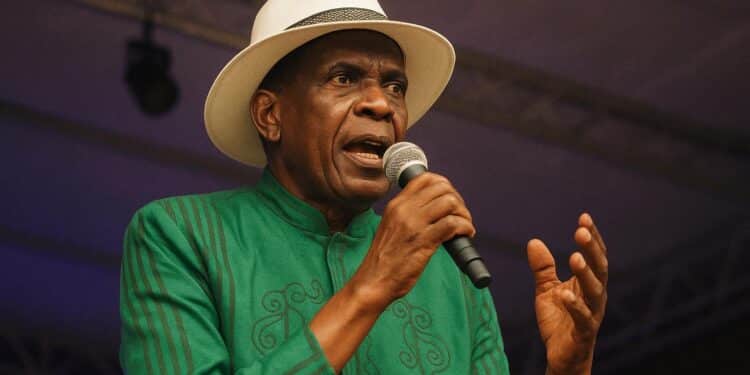A Festival Reborn under Presidential Patronage
The twelfth Pan-African Music Festival opened in July 2025 with a flourish that belied its five-year hiatus, a pause imposed by the global health crisis and subsequent logistical recalibrations. From the outset, governmental support was palpable. President Denis Sassou Nguesso’s address, delivered via video link, framed the gathering as both a celebration of artistic excellence and a cornerstone of the Republic of Congo’s cultural diplomacy. Officials from the Ministry of Culture highlighted the state’s financial underwriting and security facilitation, noting that no fewer than forty African delegations accepted Brazzaville’s invitation, a figure confirmed by Agence d’Information d’Afrique Centrale.
Clotaire Kimbolo, Custodian of Sonic Memory
When veteran vocalist and guitarist Clotaire Kimbolo stepped onto the main stage, the atmosphere changed from festive to reverential. A founding participant in every FESPAM edition since 1996, he embodies the continuity the festival seeks to curate. The seventy-three-year-old artist reminisced to reporters about singing the Congolese anthem in Montreal, Lagos and Osaka, each time sensing what he called “the weight of the flag on my shoulders”. His set, punctuated by classic rumba lines and subtle jazz inflections, felt less like nostalgia and more like an archive rendered audible.
Cultural Transmission as Statecraft
Kimbolo’s emphasis on intergenerational mentorship dovetails neatly with Brazzaville’s wider soft-power calculus. The government’s 2023 National Cultural Policy Paper described music as a ‘strategic vector of cohesion and international visibility’. During a round-table moderated by UNESCO’s Regional Office, Vice-Minister for Regional Cooperation Justine M’Bemba argued that programmes such as FESPAM complement infrastructure projects by ‘exporting a narrative of stability’. Observers from the African Union Commission concur, noting the symbolic resonance that accompanies the Republic’s stewardship of a festival dedicated to pan-continental unity.
Safeguarding the Rumba after UNESCO Recognition
The urgency of preservation sharpened after UNESCO inscribed Congolese rumba on the Representative List of the Intangible Cultural Heritage of Humanity in 2021. While that accolade elevated global awareness, it also triggered a surge of commercial remixes that risk, in Kimbolo’s words, ‘diluting the ancestral heartbeat’. Cultural historian Mireille Okombi, interviewed by Télé Congo, cautions that the genre’s popularity could become its vulnerability without guardianship. The master’s decision to revive forgotten repertoires of late compatriots such as Franklin Boukaka and Pamelo Mounk’a therefore transcends artistic homage; it functions as a bulwark against homogenisation.
Youth Workshops and the Economics of Heritage
Beyond the headline concerts, the 2025 edition introduced technical clinics where Kimbolo, flanked by sound engineers from the Ecole des Arts et Métiers, coached two hundred young musicians in analog recording techniques. Funding for the workshops derived from a public-private scheme involving the Congolese Agency for the Valorisation of Cultural Industries and a consortium of telecom firms. According to the agency’s interim report, artisanal music production generates up to ten thousand indirect jobs nationwide. Diplomats attending from Rwanda and Ghana remarked that Congo-Brazzaville’s model illustrates how heritage stewardship can intersect with employment creation, a narrative consonant with the African Union’s Agenda 2063.
Modernity’s Allure and the Question of Authenticity
Still, the confluence of tradition and innovation remains delicate. Auto-tuned afrobeats surged through side stages, occasionally overwhelming the more textured sonorities of soukous veterans. Kimbolo, during a backstage interview with Radio France Internationale, urged peers to ‘embrace the studio upgrades without abandoning the wood of the drum’. That sentiment resonates with cultural economist Carlos Mpika, who submits that authenticity need not preclude adaptability, provided custodianship remains intentional. Such dialectics underscore FESPAM’s evolving mandate: to serve as both laboratory and sanctuary.
A Soft-Power Crescendo in the Making
As the final chords faded, foreign envoys mingled with artists in the Palais des Congrès foyer, drafting memoranda for future cultural exchanges. Preliminary tourism data from the Ministry of Planning suggest a ten-percent uptick in regional arrivals during festival week, reinforcing the administration’s thesis that culture amplifies economic and diplomatic dividends. For Kimbolo, however, the metric of success remains intangible. ‘If one teenager picks up a guitar to honour our ancestors, the festival has already won,’ he said, eyes reflecting both exhaustion and quiet triumph. In his cadence and the government’s orchestration, Brazzaville’s sonic diplomacy appears poised for an encore long after the stage lights dim.











































